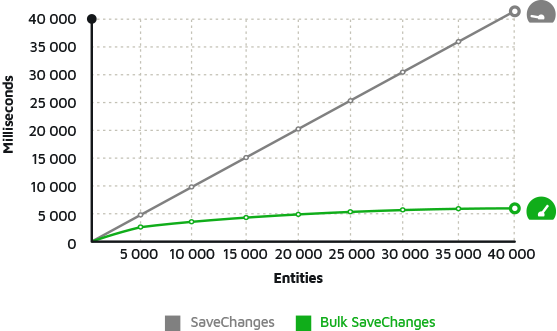Entity Framework LINQ Queries Discover the Basics About Querying
A query is an expression that retrieves data from a data source. Queries are usually expressed in a specialized query language, such as SQL for relational databases and XQuery for XML.
- Language-Integrated Query (LINQ) offers a simpler, consistent model for working with data across various kinds of data sources and formats.
- In a LINQ query, you always work with programming objects.
LINQ to Entities queries can be composed in two different syntaxes:
- Query Expression Syntax: Query expressions are a declarative query syntax. This syntax enables a developer to write queries in a high-level language that is formatted similar to Transact-SQL.
- Method-based Query Syntax: Another way to compose LINQ to Entities queries is by using method-based queries. The method-based query syntax is a sequence of direct method calls to LINQ operator methods, passing lambda expressions as the parameters.
Select
Projects each element of a sequence into a new form.
using (var context = new BookStore()) { var authors = context.Authors .Select(author => new { Id = author.AuthorId, FullName = author.FirstName + " " + author.LastName, Books = author.Books }).ToList(); }
SelectMany
Projects each element of a sequence to an IEnumerable and combines the resulting sequences into one sequence.
using (var context = new BookStore()) { var allBooks = context.Authors .SelectMany(a => a.Books).ToList(); }
Where
Filters a sequence of values based on a predicate. Each element's index is used in the logic of the predicate function.
using (var context = new BookStore()) { var allBooks = context.Books .Where(b => b.Title.Contains("Fundamentals")) .ToList(); }
OrderBy
Sorts the elements of a sequence in ascending order by using a specified comparer.
using (var context = new BookStore()) { var allBooks = context.Books .OrderBy(b => b.Title) .ToList(); }
OrderByDescending
Sorts the elements of a sequence in descending order by using a specified comparer.
using (var context = new BookStore()) { var allBooks = context.Books .OrderByDescending(b => b.Title) .ToList(); }
ThenBy
Performs a subsequent ordering of the elements in a sequence in ascending order by using a specified comparer.
using (var context = new BookStore()) { var authors = context.Authors .OrderBy(a => a.LastName) .ThenBy(a => a.FirstName) .ToList(); }
ThenByDescending
Performs a subsequent ordering of the elements in a sequence in descending order by using a specified comparer.
using (var context = new BookStore()) { var authors = context.Authors .OrderBy(a => a.LastName) .ThenByDescending(a => a.FirstName) .ToList(); }
Skip
Bypasses a specified number of elements in a sequence and then returns the remaining elements.
using (var context = new BookStore()) { var authors = context.Authors .OrderBy(a => a.FirstName) .ThenBy(a => a.LastName) .Skip(2) .ToList(); }
Take
Returns a specified number of contiguous elements from the start of a sequence.
using (var context = new BookStore()) { var authors = context.Authors .OrderBy(a => a.FirstName) .ThenBy(a => a.LastName) .Take(2) .ToList(); }
First
Returns the first element of a sequence.
using (var context = new BookStore()) { var author = context.Authors .First(); }
FirstOrDefault
Returns the first element of a sequence that satisfies a specified condition or a default value if no such element is found.
using (var context = new BookStore()) { var author = context.Authors .FirstOrDefault(); }
Single
Returns the only element of a sequence that satisfies a specified condition, and throws an exception if more than one such element exists.
using (var context = new BookStore()) { var author = context.Authors .Single(a => a.AuthorId == 2); }
SingleOrDefault
Returns the first element of a sequence that satisfies a specified condition or a default value if no such element is found.
using (var context = new BookStore()) { var author = context.Authors .SingleOrDefault(a => a.AuthorId == 2); }
Any
You can use the Any method to determine whether a sequence contains any elements.
using (var context = new BookStore()) { var author = context.Authors .Where(a => a.Books.Any()).ToList(); }
ZZZ Projects
